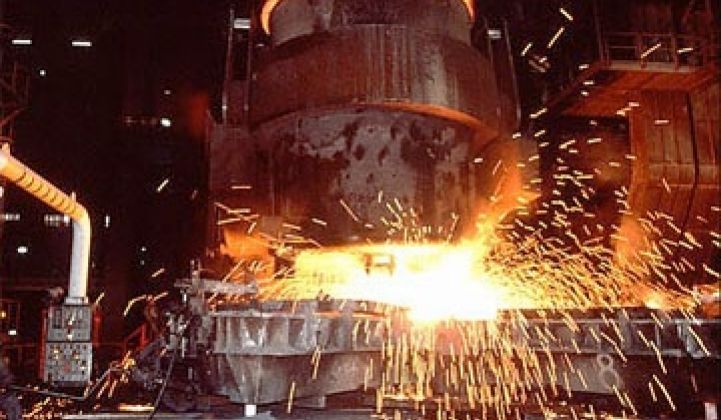A-Power Energy Generation Systems, the wind turbine manufacturer from China, is turning into a real "America First" outfit.
The company -- which is part of a Sino-U.S. consortium building a large wind farm in Texas and a turbine factory in Nevada -- announced an alliance today with the United Steel Workers that will ultimately lead to a U.S.-based supply chain for the company. Manufacturing, assembly, component sourcing -- the USW will work on all aspects of those projects with A-Power, Sheyang Power Group (the developer) and others.
A-Power and SPG anticipate purchasing over time approximately 50,000 tons of steel to be manufactured in unionized American steel mills to supply the towers for a 615MW wind farm in Texas.
A U.S. union linking up with Chinese companies to produce jobs in the U.S. will likely surprise many who have come to believe that the only advantage Chinese companies have lies in cheap labor. And for the conspiracy-minded who've somehow come to believe that U.S. unions are controlled by an international proletariat, it might confirm their deepest fears. But for people in the steel industry, it should mean jobs and revenue.
What is driving the deal? China has launched a massive plan to become a leader in alternative energy technologies. Under the plan, Chinese companies will try to export wind turbines and solar panels and, when demand is slack, plant these products in their own country. The domestic agenda will typically take a backseat whenever exports are possible. Texas has embraced wind heartily, so it's a natural place to start.
Meanwhile, building overseas gives Chinese banks an opportunity to land deals. U.S. financiers are being incredibly picky about which projects to back, which has become a drag on the solar industry. (Thanks again, Wall Street.) That hesitancy has left a void that Chinese banks are all too willing to fill. Coda Automotive, a Sino-U.S. electric car company, and Lishen are building a battery factory in Ohio to supply Coda with batteries. Chinese banks are largely funding the effort.
Third, Chinese companies are rapidly figuring out the U.S. political system. Suntech Power Holdings is building a module assembly facility in Arizona that will help the Chinese company land federal and state solar contracts. Yingli and others will follow suit.
Last year, after A-Power and SPG announced the Texas wind farm, Senator Charles Schumer (D-N.Y.) complained that the project would lead to 2,800 jobs in China and 240 in the U.S. Soon afterwards, A-Power announced it would build a factory in the U.S. that would employ 1,000. So now Schumer and Harry Reid are placated and in a few years people in Texas will get power.
Duke, meanwhile, is working with ENN, a Chinese company that started as a car rental company and now has a sprawling solar outfit, to build power plants in the U.S.
So again, Chinese companies are gaining ground in the U.S. but they aren't gaining ground just because they can enjoy lower labor costs. Like Japanese companies and South Korean companies before them, Chinese companies are graduating from serving as behind-the-scenes manufacturers and becoming global brand names in their own right -- and it is happening in energy first. In fact, there is a good chance your next employer will come from China.



